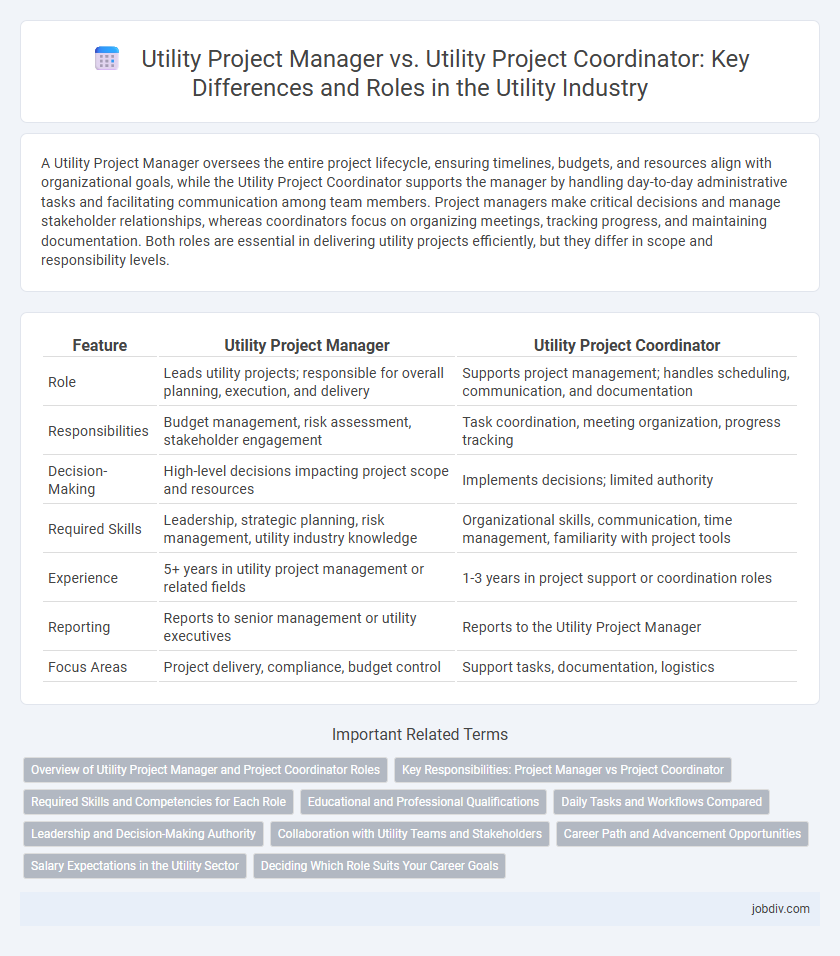A Utility Project Manager oversees the entire project lifecycle, ensuring timelines, budgets, and resources align with organizational goals, while the Utility Project Coordinator supports the manager by handling day-to-day administrative tasks and facilitating communication among team members. Project managers make critical decisions and manage stakeholder relationships, whereas coordinators focus on organizing meetings, tracking progress, and maintaining documentation. Both roles are essential in delivering utility projects efficiently, but they differ in scope and responsibility levels.
Table of Comparison
| Feature | Utility Project Manager | Utility Project Coordinator |
|---|---|---|
| Role | Leads utility projects; responsible for overall planning, execution, and delivery | Supports project management; handles scheduling, communication, and documentation |
| Responsibilities | Budget management, risk assessment, stakeholder engagement | Task coordination, meeting organization, progress tracking |
| Decision-Making | High-level decisions impacting project scope and resources | Implements decisions; limited authority |
| Required Skills | Leadership, strategic planning, risk management, utility industry knowledge | Organizational skills, communication, time management, familiarity with project tools |
| Experience | 5+ years in utility project management or related fields | 1-3 years in project support or coordination roles |
| Reporting | Reports to senior management or utility executives | Reports to the Utility Project Manager |
| Focus Areas | Project delivery, compliance, budget control | Support tasks, documentation, logistics |
Overview of Utility Project Manager and Project Coordinator Roles
Utility Project Managers oversee the planning, execution, and completion of utility infrastructure projects, ensuring adherence to budget, schedule, and regulatory compliance. Utility Project Coordinators support these efforts by managing documentation, facilitating communication among stakeholders, and monitoring project progress. Both roles are critical for effective project delivery, with managers focusing on strategic decision-making and coordinators handling operational coordination.
Key Responsibilities: Project Manager vs Project Coordinator
Utility Project Managers oversee the entire project lifecycle, including planning, budgeting, resource allocation, risk management, and stakeholder communication to ensure utility infrastructure projects meet regulatory standards and deadlines. Utility Project Coordinators support project managers by organizing schedules, tracking project progress, managing documentation, and facilitating communication among teams and contractors. The Project Manager drives strategic decision-making and overall project success, while the Project Coordinator focuses on operational tasks that maintain workflow efficiency and data accuracy.
Required Skills and Competencies for Each Role
Utility Project Managers require strong leadership, strategic planning, and risk management skills to oversee complex utility infrastructure projects from initiation to completion. Utility Project Coordinators focus on excellent organizational abilities, communication, and detail-oriented task management to support project teams and ensure smooth day-to-day operations. Both roles demand proficiency in utility regulations, project management software, and stakeholder engagement to drive efficient and compliant project execution.
Educational and Professional Qualifications
Utility Project Managers typically require a bachelor's degree in engineering, construction management, or a related field, along with professional certifications such as PMP (Project Management Professional) to demonstrate advanced project leadership skills. Utility Project Coordinators often hold an associate degree or a bachelor's in business administration or utility management, with experience in project support roles and familiarity with utility industry standards being essential. Both roles benefit from knowledge of utility-specific regulations and software, but managers emphasize strategic decision-making and budget oversight, while coordinators focus on administrative and logistical support.
Daily Tasks and Workflows Compared
Utility Project Managers oversee project planning, budgeting, and stakeholder communication to ensure utility projects meet deadlines and standards. Utility Project Coordinators focus on scheduling, resource allocation, and daily progress tracking to support seamless project execution. Their workflows intersect in team collaboration and reporting but differ in responsibility scope and decision-making authority.
Leadership and Decision-Making Authority
A Utility Project Manager holds primary leadership responsibility, making strategic decisions that shape project direction, resource allocation, and stakeholder engagement. The Utility Project Coordinator supports these efforts by managing day-to-day tasks, facilitating communication, and tracking progress under the manager's guidance. Decision-making authority largely resides with the Project Manager, who ensures project objectives align with organizational goals and compliance standards.
Collaboration with Utility Teams and Stakeholders
Utility Project Managers lead strategic collaboration with utility teams and stakeholders, ensuring alignment on project goals, timelines, and resource allocation to optimize operational efficiency. Utility Project Coordinators facilitate day-to-day communication and coordination among utility staff, contractors, and external partners, addressing immediate issues and maintaining workflow continuity. Both roles require strong interpersonal skills and a deep understanding of utility operations to support seamless project execution and stakeholder engagement.
Career Path and Advancement Opportunities
Utility Project Managers typically oversee the entire project lifecycle, making key decisions and managing budgets, which positions them for senior leadership roles such as Utility Operations Director or Program Manager. Utility Project Coordinators support project managers by handling scheduling, documentation, and communication, providing foundational experience that can lead to project management positions. Career advancement for coordinators often involves gaining project management certifications and technical expertise, while managers focus on strategic leadership and expanded portfolio responsibilities.
Salary Expectations in the Utility Sector
Utility Project Managers typically command higher salary expectations than Utility Project Coordinators due to greater responsibilities, including overseeing project budgets, timelines, and stakeholder communications. According to industry reports, average salaries for Utility Project Managers range from $85,000 to $120,000 annually, while Utility Project Coordinators earn between $50,000 and $70,000. Salary variations depend on factors such as project complexity, regional demand, and years of experience within the utility sector.
Deciding Which Role Suits Your Career Goals
Utility Project Managers oversee the planning, execution, and completion of utility infrastructure projects, ensuring timelines, budgets, and regulatory compliance are met. Utility Project Coordinators support these efforts by managing schedules, documentation, and communication between stakeholders to maintain project flow. Choosing between these roles depends on whether you prefer leadership and strategic decision-making (Project Manager) or operational support and detailed organization (Project Coordinator) within the utility sector.
Utility Project Manager vs Utility Project Coordinator Infographic

 jobdiv.com
jobdiv.com